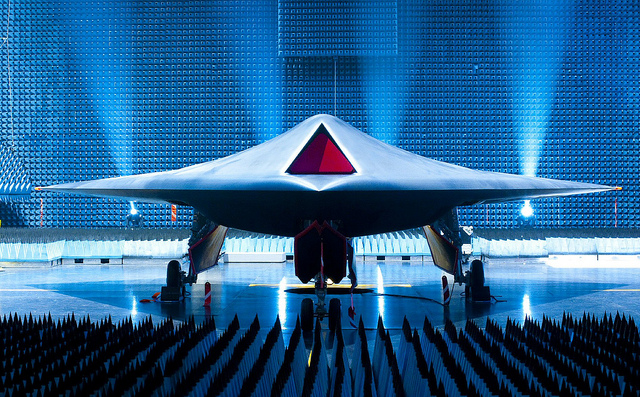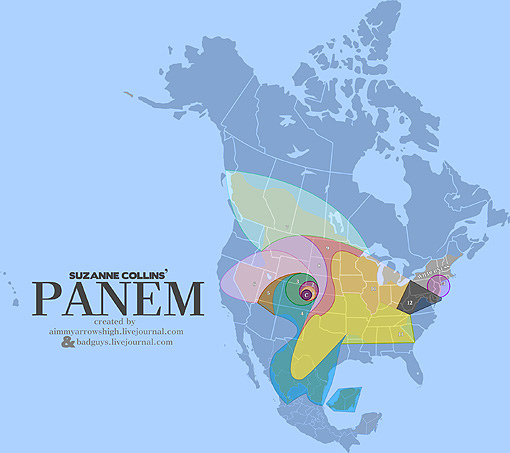Let’s look into the intriguing world of Panem from The Hunger Games Trilogy. No spoilers though! You need to find out some things yourself. That’s the fun of reading! Those moments of “No way!” or “Yikes!” or “Ah Pa, that makes me cry.”

Mockingjay Pin photo credit: KendraMillerPhotography via photopin cc
Through the three books, the world of Panem unfolds solely through the eyes of Katniss Everdeen. Things commonplace to her are treated as we treat our own common knowledge.
However, Katniss grew up in a backwater district, far removed from the odder more fantastic elements of Panem. Her normal world is one easily imagined though not easily lived, a life of poverty, of scraping by, of every waking moment consumed with procuring the next meal.
We readers come into the books in a similar state of awareness as Katniss. We are from a backwater time in the past, a time when peace on the North American continent wasn’t forced upon its inhabitants by a totalitarian government… at least not yet. We experience the Capitol, its Districts, and its horrific games from Katniss and many times along with Katniss.
The Hunger Games and its two sequels become moral tales, especially about relationships. But that topic is for a book review. Today, let’s discuss five aspects of the science fiction world of Panem and some lessons our culture and we as individuals can take from it.
1. Technology
Any discussion of a science fiction world naturally starts with technology, because technology is to science fiction as magic is to fantasy. It’s what makes things happen, what makes things different, what makes things wondrous to our brains.

Future Technology photo credit: QinetiQ group via photopin cc
Panem boasts some amazing technologies especially related to:
•Genetic manipulation, which the Capitol authorities only to use for horrors rather than good;
•Medicine, which for the most part stays firmly in the hands of the Capitol;
•Weapons, tilted toward chemical and psychological warfare; and
•Haute couture fashion, which exists only in the Capitol and reflects its decadence and self-indulgence.
The author Suzanne Collins doesn’t dwell too long on describing Panem’s technology. Like a good storyteller, she keeps her narrative focused on what a technology means for her main character. A story can easily become weighed down with overly detailed descriptions.
Other than a writing lesson, what can we come away with from this?
The lesson is that technology in itself is amoral, neither good or bad inherently. The moral choice is on us as we decide what to do with our shiny tools.
2. Society
Panem’s society is a rigid class system. There’s the haves that live in the Capitol. And there’s the have nots, who are slaves. Even the people in the more favored districts of 1, 2, and 4 are no better than distant slaves kept in check by fear and by their own brethren, the ominously named Peacekeepers.
Panem’s slaves are not in physical contact with their masters. In fact, the masters rarely see any slaves except in the annual Hunger Games broadcast, a feature that further dehumanizes anyone that is not Capitol bred.
By the last book Mockingjay we find out ways the Hunger Game victors have been kept in servitude, and of the worst sorts, after their ‘victories.’ No matter how much you can obtain, no one outside the Capital can become a have.
What can we learn here?
Firstly, that it doesn’t take proximity to victimize. This pertains to our culture in corporate business decisions on working conditions in third world countries.
Also, that a good government and a good middle class encourage each other. The dearth of a healthy middle class is the doom of democracy.
But what can an individual do?
Hmm… Watch what you’re buying for one.
For another, get involved in a reputable charity that provides for the poor in international settings. Look into Compassion International, the North American Mission Board and the International Mission Board of the Southern Baptist Convention, Samaritan’s Purse, or Heifer International.
3. History
Suzanne Collins tantalizes us with hints at Panem’s past, but she gives no definite answers in the books.

Panem photo credit: JoeInSouthernCA via photopin cc
But a load of questions come up.
What had happened to North America? Why were there cataclysmic natural disasters? What ruination rained down on the continent due to war? What about the rest of Earth’s nations? And why are the citizens of the Capitol so cruel?
What’s the lesson from such a past that made such a mess in the present?
The same as Jesus gave us:
Be nice to each other.
4. Zoology and Botany
Plants and animals in Panem are for the most part familiar… until the games. That’s when the muttations are introduced. Of Katniss’s world, the muttations are the most frightening aspect save one: The people who make and use them.
A society that can accomplish a feat of genetic engineering like this could have turned their innovations to more humane endeavors.
Our lesson? Anything can be weaponized. But strengths can just as easily be set to good.
I think that’s back to ‘be nice.’ It’s a good lesson we still are trying to learn.
5. Theology
Theology? In The Hunger Games?
In a book, theology is evidenced in what assumptions the characters or even the book’s world makes.
Granted, there is no mention in any of these books of a God, or gods, or even a belief system.
But some telling assumptions are made.
First, Katniss believes there is a right and wrong. So does Peeta, and Gale, and even Haymitch. This belief brings along the concept of justice.
Second, whether in the Capitol or the Districts, many people live their lives as if survival is all there is. So it is here now. But as Peeta reminds Katniss and us, it’s more about who we are and who we stay.
Third, power without morality leads to cruelty, especially if the people in power think they’re getting away with it. But no one gets away with anything. This business of power and rightness is a theological premise on why God being perfectly good is as important as God being all-powerful.
Lesson? Belief motivates deed. Actions and inactions are based on what you believe. There are no decisions in a God-vacuum.
I hope you’ve enjoyed gleaning insights from popular science fiction. If you have any comments, please leave them below.
And may the blogs ever be in your favor.






Never thought about this stuff in the book! So true though. Neat
It’s obvious that I got pulled into this world and story. That’s what I like about a good story – immersion.
This makes me want to go back and re-read the first two books–I reread Mockingjay this past year so it’s fresher in my memory. I loved this series. So much better than the equally popular Twilight series and Katniss a much better role model for girls.
Have you seen the Pinterest pin that has Princess Leia, Hermoine Granger, Katniss Everdeen, and the girl from Twilight? Leia says, ” I led an army.” Hermione says, “I fought a dark lord.” Katniss says, “I started a rebellion.” The Twilight gal says, “I got married.” Thanks for reading the blog and thanks for encouraging reading!